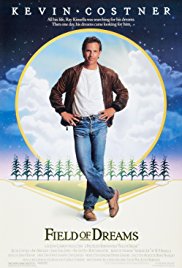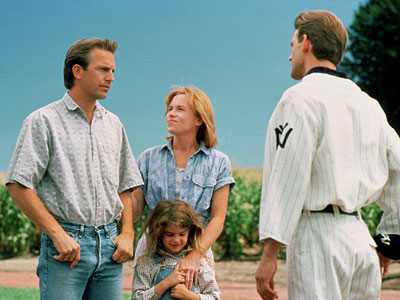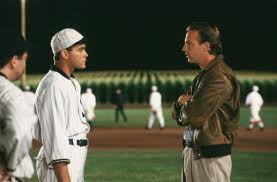FIELD OF DREAMS
SUBJECTS — Sports/Baseball; U.S./1945 – 1991 & Iowa;
SOCIAL-EMOTIONAL LEARNING — Grieving;
MORAL-ETHICAL EMPHASIS — Trustworthiness.
AGE: 10+; MPAA Rating — PG;
Drama; 1989; 106 minutes; Color. Available from Amazon.com.
There is NO AI content on this website. All content on TeachWithMovies.org has been written by human beings.

SUBJECTS — Sports/Baseball; U.S./1945 – 1991 & Iowa;
SOCIAL-EMOTIONAL LEARNING — Grieving;
MORAL-ETHICAL EMPHASIS — Trustworthiness.
AGE: 10+; MPAA Rating — PG;
Drama; 1989; 106 minutes; Color. Available from Amazon.com.
TWM offers the following worksheets to keep students’ minds on the movie and direct them to the lessons that can be learned from the film.
Film Study Worksheet for ELA Classes and
Worksheet for Cinematic and Theatrical Elements and Their Effects.
Teachers can modify the worksheets to fit the needs of each class. See also TWM’s Movies as Literature Homework Project.

Ray Kinsella is an Iowa farmer with a wife and a little girl. He has never resolved his conflicts with his baseball-loving father who had died many years before. As the movie opens, Kinsella begins to hear voices and becomes obsessed with an urge to build a baseball stadium in his best corn field. When the field is built it is visited by the ghosts of frustrated baseball players, including Kinsella’s father. Through the events in the film, Kinsella overcomes his feelings of guilt about his relationship with his father and can, at last, grieve for his father’s death.
Selected Awards:
1989 Academy Award Nominations: Best Picture, Best Adapted Screenplay, Best Original Score.
Featured Actors:
Kevin Costner, Amy Madigan, James Earl Jones, Burt Lancaster, Ray Liotta, Timothy Busfield, Frank Whaley, Gaby Hoffman.
Director:
Phil Alden Robinson.

This film will introduce children to self-forgiveness and its essential role in normal grieving, problems of censorship, and the 1919 Black Sox baseball scandal, a formative event in the development of modern baseball.
MINOR. There is one uncritical reference to the heroine and hero smoking marijuana in college. There is mild profanity.
Ask and help your child to answer the Quick Discussion Question. Tell your child about the Chicago “Black Sox Scandal” and what that meant to major league baseball. See the Helpful Background section.
In 1919, gamblers bribed seven players on the Chicago White Sox to allow the Cincinnati Reds to win the World Series. The next year the seven and an eighth player, who knew about the scheme but didn’t report it, were banned from baseball for life. The “Black Sox Scandal” was the worst scandal in the history of baseball. The response of major league baseball, i.e., zero tolerance for cheating, set the tone for professionals sports that continues to the present day. This policy has been a major factor in the success of baseball and other professional sports in the U.S. The seven players were Eddie Cicotte, Happy Felsch, Chick Gandil, Joe Jackson, Fred McMullin, Swede Risberg, and Lefty Williams. Buck Weaver was the man who did not take the bribe but knew about it and didn’t report it.
The Nazis burned books when they didn’t agree with the contents or when the authors were Jewish. Eva Braun was Hitler’s girlfriend, whom he married just before they died in a mutual suicide pact.
1. See Discussion Questions for Use With any Film that is a Work of Fiction.
2. Was the punishment given to the players involved in the Chicago Black Sox scandal justified? Why was it so severe?
3. Moonlight Graham had wanted all his life to be a professional ball player. Remember when he came out of the field and out of death to save the daughter from choking? What is the author trying to tell us by putting this incident into the film?
1. Did Ray Kinsella feel guilty about the way he had treated his father? How did this affect his ability to grieve his father’s death?
2. What was Ray Kinsella’s attitude toward his father when the movie opened and how did that change?
3. Did the fact that Ray Kinsella had a daughter have anything to do with his sudden need to reconcile with his father’s memory? Was the age of the daughter, just when a child begins to learn how to throw balls and catch, a factor as well?
Discussion Questions Relating to Ethical Issues will facilitate the use of this film to teach ethical principles and critical viewing. Additional questions are set out below.
(Be honest; Don’t deceive, cheat or steal; Be reliable — do what you say you’ll do; Have the courage to do the right thing; Build a good reputation; Be loyal — stand by your family, friends, and country)
1. Why is a zero tolerance attitude toward cheating and gambling essential to the success of professional sports? What does this tell you about the importance of trustworthiness as a general rule of behavior for everyone?
This Learning Guide was last updated on December 9, 2009.